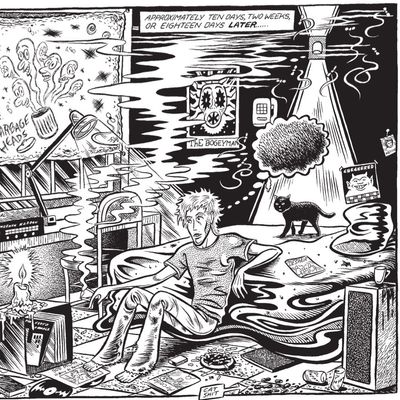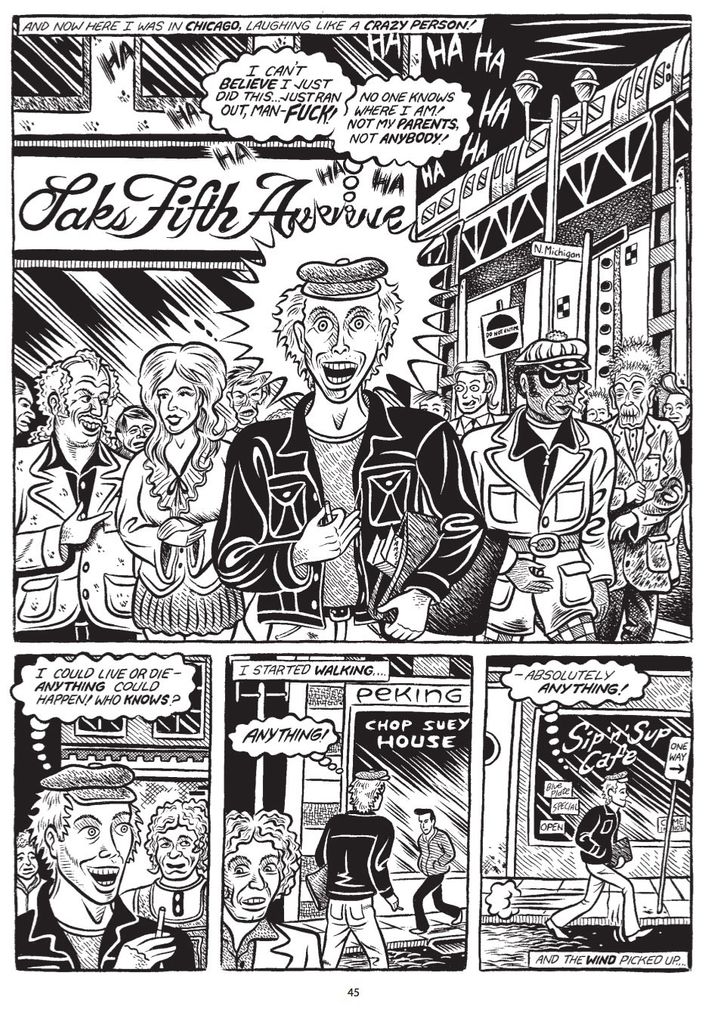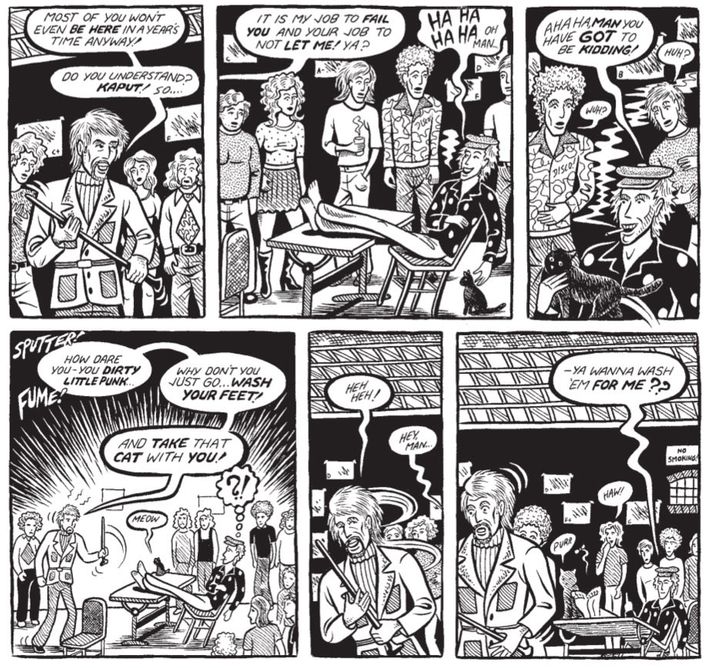
ThereÔÇÖs always something pornographic about a good memoir. Even if thereÔÇÖs no actual sex in the tale, weÔÇÖre still drawn to the forbidden thrill of seeing behind closed doors and witnessing parts of the human experience weÔÇÖre not supposed to discuss in polite society. We crave the sweet release of seeing someone else be as shitty and stupid as we fear we might be. In his breathtaking new semiautobiographical graphic novel, Chicago, Glenn Head is the best kind of emotional-smut peddler, offering a mouthwatering medley of humiliations, obsessions, jealousies, and poor decisions.
The basic structure of the story is as familiar as its execution is surprising: A New Jersey teenager named Glen (note the single n, a warning against interpreting the story as strictly nonfictional) leaves his one-horse New Jersey town in the late 1970s, drops out of art school to pursue his dreams of being a cartoonist, struggles with poverty and failure on the streets of Chicago, and reconciles with his estranged family. It even concludes with the protagonist unexpectedly reuniting with a long-lost love.
But while these tropes should be wearisome and worrisome for readers of autobiographical novels, Chicago transcends them and offers something bracingly fresh. The key here is the utter lack of sympathy Head offers to his lead character. Although Glen isnÔÇÖt an evil or malicious man, he is exceptionally narcissistic and wholly unable to make reasonable decisions. This is not a wistful bildungsroman about an artsy young man whoÔÇÖs too clever for the mundane world around him. This is a story about a fool, born into a kind and privileged family, who selfishly squanders nearly every opportunity that comes his way. (To make matters worse, Head draws Glen with a persistent smirk.)

Indeed, thereÔÇÖs an element of George OrwellÔÇÖs Two Minutes Hate in some of GlenÔÇÖs more astoundingly misguided moments ÔÇö they offer the reader a chance for arousingly pure disdain. For example: In an early scene, the incorrigibly lazy Glen decides to skip all of his art-school classes for no reason, instead smoking endless cigarettes in his squalid dorm (pity his underfed cat and put-upon roommate). During this period of indulgent sloth, he has the audacity to tell someone from his life-drawing class, ÔÇ£You know, IÔÇÖm thinking lately that life experience is more important than life drawing,ÔÇØ to which the schoolmate replies, ÔÇ£You hardly even go to class!ÔÇØ GlenÔÇÖs only response is a self-satisfied ÔÇ£YehÔÇØ and a rant about not wanting to be a ÔÇ£slave to some master.ÔÇØ He fucks off to Chicago soon afterward without informing his loving parents. Oh, and I wonÔÇÖt even get into the part where Glen has sexual fantasies about the Holocaust, or the time he runs into Muhammad Ali and racially taunts him, just for shock value. The artist may be a young man, but thereÔÇÖs nothing noble about his portrait.
The story is almost an inverse Book of Job: Fate keeps handing Glen second chances, and he keeps tossing them away out of misplaced pride and poor judgment. But hereÔÇÖs where the bookÔÇÖs status as (partial) memoir becomes crucial. If this were a tale about some wholly fictional character, the novel would be sadistic and shallow. But Head is talking about himself. Viewed through that lens, the book becomes brutally introspective, instead of sadistically condescending. This kind of unflinching self-observation is gripping, admirable, and indelible. By the time we see a grown-up Glen ruminating on his past (while still being something of a sleazy asshole), weÔÇÖre intimately attached to him, even if the primary lesson heÔÇÖs taught us is to never do anything he does.

And the artwork is wonderful. Though Glen spends much of his life idolizing underground-comix god R. Crumb (and Crumb, himself, makes a memorable cameo during the Chicago exile), ChicagoÔÇÖs visuals bear little relation to CrumbÔÇÖs epoch-defining pointillism. HeadÔÇÖs artwork is filled with smooth lines and thick waves of ink, creating blocky and compelling images in the vein of Frans MasereelÔÇÖs mid-century woodcuts. But it does retain CrumbÔÇÖs love of overstuffed imagery, with hand-drawn signage and labels causing chaos in often-massive panels. Every scene is just a few extra lines away from becoming surreal, and itÔÇÖs hard to take your eyes off a style that stands on the threshold of nightmarish-ness.
In fact, the whole novel is about thresholds: between self-discovery and selfishness, between independence and ignorance, between exploration and overindulgence. ItÔÇÖs about as fun as despising someone can get.

